Good morning, and welcome to the U-T Arts & Culture Newsletter.
I’m David L. Coddon, and here’s your guide to all things essential in San Diego’s arts and culture this week.
If you need a lift during these troubled times, take four and a half minutes out of your day and experience San Diego IndieFest founder Danielle LoPresti’s video performance of “22 Mountains.” The re-recording of the title track from a 2003 album by LoPresti and her band, The Masses, is a passionate exhortation of hope and courage, slightly reworded from the original composition by LoPresti and Matthew Stewart. The message — to parents, to teachers, to artists, to activists, to visionaries — is clear: Don’t give up.
“This (’22 Mountains’) was a simple song off my second release,” LoPresti explained from her home in Oakland. “For whatever reason, a lot of people over the years told me they have really identified with it. Alicia (Champion, LoPresti’s spouse and collaborator) suggested this COVID time might be an appropriate time to revisit this. And after the Capitol attack, she just looked at me and said ‘Let’s just do this right. Let’s send a love letter out to the world.’”
For the virtual recording, LoPresti was able to reunite many of the original members of The Masses, including Stewart on guitar, percussionist Tre Balfour, keyboardist Stephen Snyder, drummer Kevin Dow and bassist Kelly Bowen, as well as Champion.
“Artists are starved to create, so everyone got back immediately,” LoPresti said. “We just asked them to record themselves on their cell phones: quick and dirty and easy. Just play your part and record yourself and we’ll throw it together.”
As you’ll discover, the resultant video hardly looks or sounds thrown together. Give yourself over to it.
“I hope people will feel less alone and feel connected in that way that music can do,” LoPresti said. “Having to stay physically so far from one another has a cost. We wanted to serenade our human family and just say ‘We love you’ to as many people as we could.”
Theater
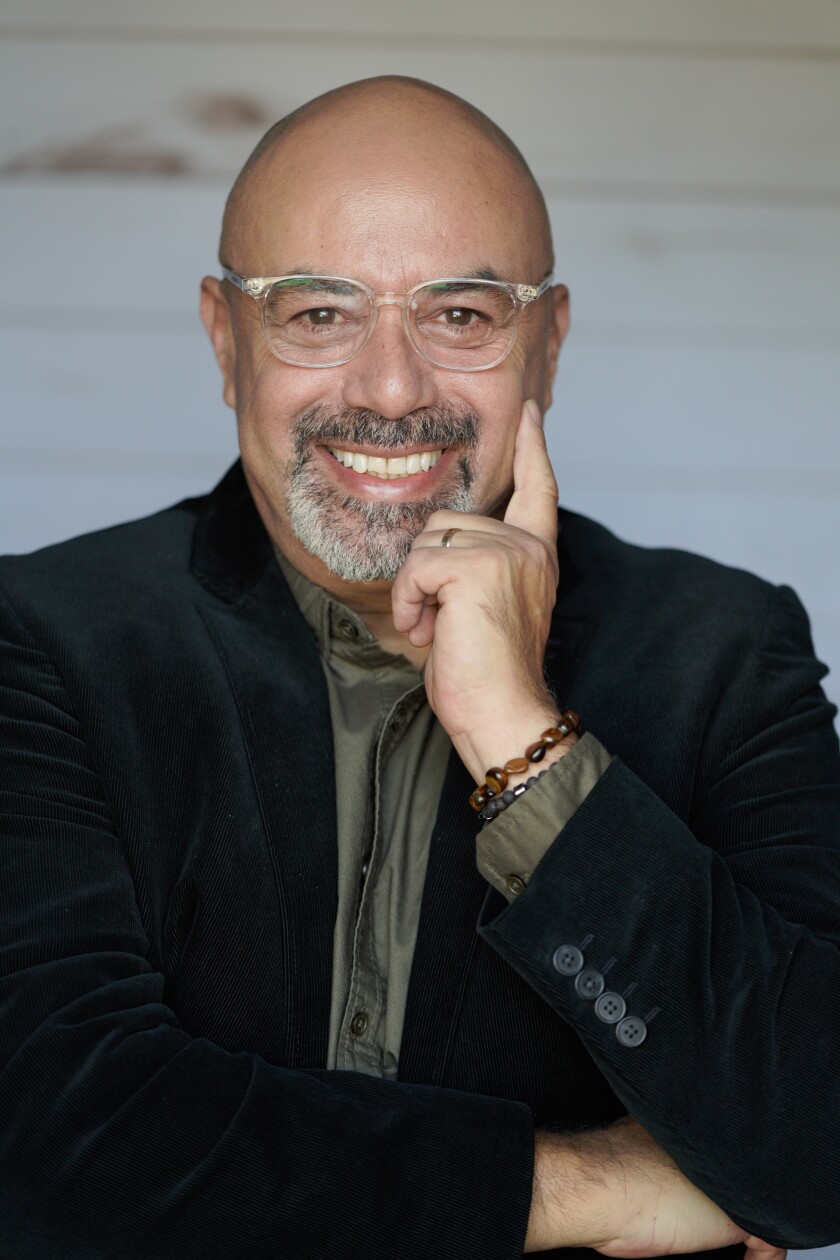
Herbert Siguenza, playwright in residence at San Diego Repertory Theatre.
(Courtesy of Daren Scott)
Count on Herbert Siguenza, founding member of Culture Clash and the San Diego Repertory Theatre’s playwright-in-residence, to delight and entertain even without the benefit of a live stage. His newest creative project is a monthly digital program he calls “VAMOS” (Let’s Go!).
In each episode, debuting the second Monday of each month at 7 p.m. on the Rep’s YouTube channel and Facebook page, Siguenza hosts a fast-paced guide to a different Latin American country, flavored with his singular brand of wit.
The first episode on Jan. 11, which you can still stream, is focused on Peru — land of llamas, the pan flute and Machu Picchu. But we learn so much more in the 15-minute show: Peru is twice the size of Texas. Peru abolished slavery 44 years before the U.S. did. Peruvian rock ‘n’ roll groups “sound like ‘80s bands.” The many hats commonly worn in Peru have symbolic meaning.
Siguenza introduces us to the nation’s historical personages and to still-living artists like sculptor Victor Delfín and photographer Atoq Ramón. He steps aside for a song performed by Peruvian Latin Grammy winner Susana Baca, then returns in a closing cuisine segment to show us how to make Peruvian-style ceviche.
As a college professor, I don’t say this lightly: “VAMOS!” is more fun than going to school. The next episode drops Feb. 8.
Music
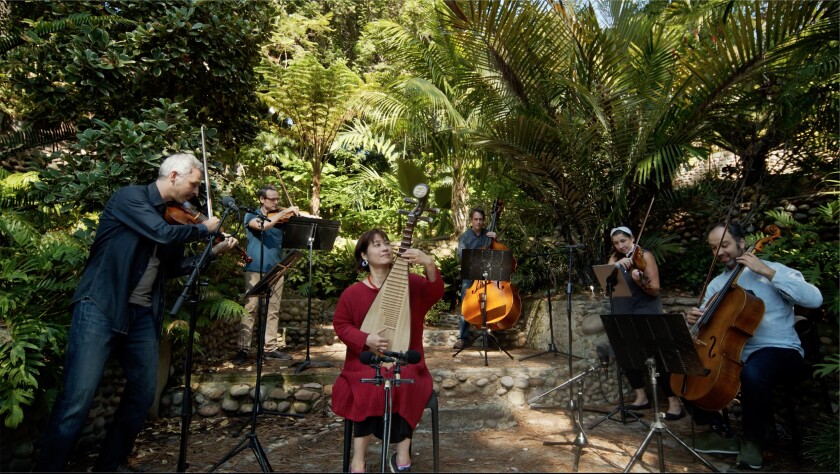
Colin Jacobson, Travis Maril, Wu Man, Jeremy Kurtz-Harris, Kate Hatmaker and Alex Greenbaum in Art of Elan’s “Bits and Pieces.”
(Courtesy photo)
We now venture from Peru to a place closer to home: Joshua Tree. Harrison House Music, Arts & Ecology is the scenic backdrop for a world-premiere video performance, “Bits and Pieces.” The collaboration between San Diego’s Art of Élan and the New York orchestral collective The Knights stars pipa virtuoso Wu Man among a string quintet, with choreography and dancing from Maile Okamura of the Mark Morris Dance Group.
The 10-minute performance — subtitled “Lou Harrison’s Concerto for Pipa and Strings” — takes full and impressive advantage of the Joshua Tree setting, with the quintet shaded by lush trees and Okamura dancing in changing light and alternating indoor and outdoor spaces.
The four-part “Bits and Pieces” testifies not only to the beauty of Joshua Tree but to the mesmerizing sound of the pipa, a Chinese instrument that dates back nearly 2,000 years.
Streaming
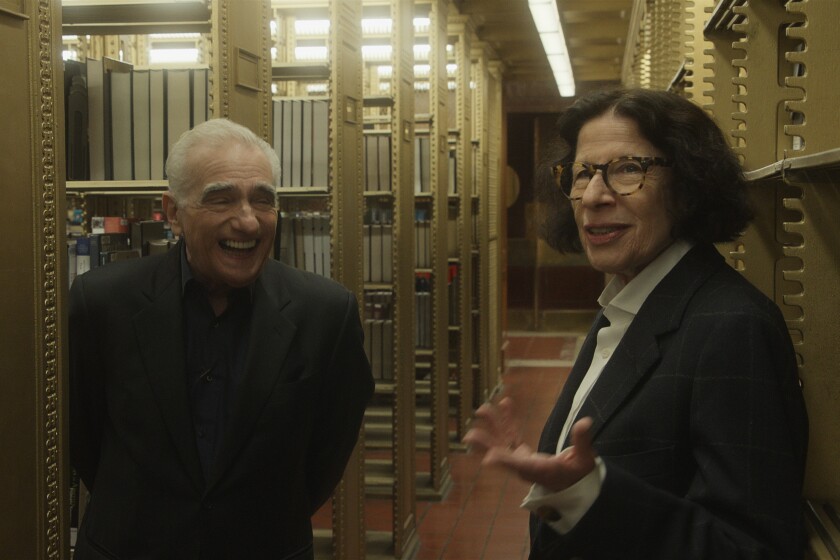
Martin Scorsese and Fran Lebowitz in “Pretend It’s a City”
(Netflix)
If New York City at its most audacious and least prone to suffering fools was a person, it would be Fran Lebowitz. The longtime essayist and outspoken commentator gets her say — and gets it and gets and gets it — in a new Netflix series called “Pretend It’s A City.”
The 30-minute show is directed by Martin Scorsese, who also directed the 2010 HBO documentary of Lebowitz titled “Public Speaking.” Over the course of seven episodes, Lebowitz opines as only she can on culture, on life in America, on the arts, on the little and big things that annoy the hell out of her. A sampling:
“Let me tell you what smells horrible on the L train: the passengers.”
“There are millions of people in New York and the only person looking where they’re going is me.”
“About one-third of the people in the street in New York City have a yoga mat. That alone would keep me from yoga.”
Can this caustic comment-fest sustain itself for seven episodes? Yes! Lebowitz is irresistibly frank and irreverent. At the same time, Scorsese brilliantly captures the Big Apple that so many (myself included) love in spite of its well-documented flaws. All that and cameo appearances by Spike Lee, the late Toni Morrison and a younger, dark-haired Alec Baldwin.
Theater, Part II
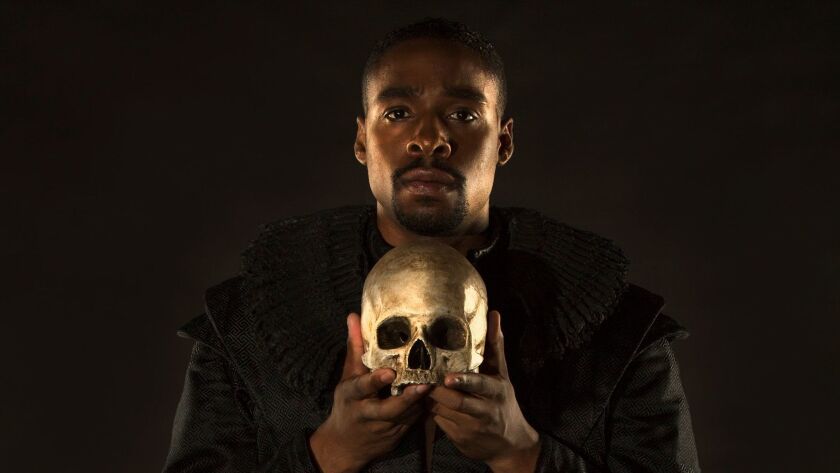
Grantham Coleman appears in the title role of Hamlet, by William Shakespeare, directed by Barry Edelstein
(Jim Cox)
The Old Globe unveiled its 2021 theatrical season Tuesday with a lineup of online and onstage offerings that include a radio adaptation of William Shakespeare’s “Hamlet,” a new musical, an outdoor production of “Hair” and numerous plays by artists of color.
Because of the uncertainties of the pandemic, the new season has few dates attached to the planned shows. If public health orders permit, Globe Artistic Director Barry Edelstein said he hopes to begin offering outdoor performances on the Lowell Davies Festival stage by late summer or early fall, followed by indoor productions. He’s optimistic that audiences will be eager to return.
“I think there will be a clamor to get out of the house to be in groups again and to be entertained,” said Edelstein, who added that future productions will be captured on high-quality video for home-streaming for those audience members hesitant to return due to health concerns.
Read more in this story by the Union-Tribune’s Pam Kragen.
UCTV
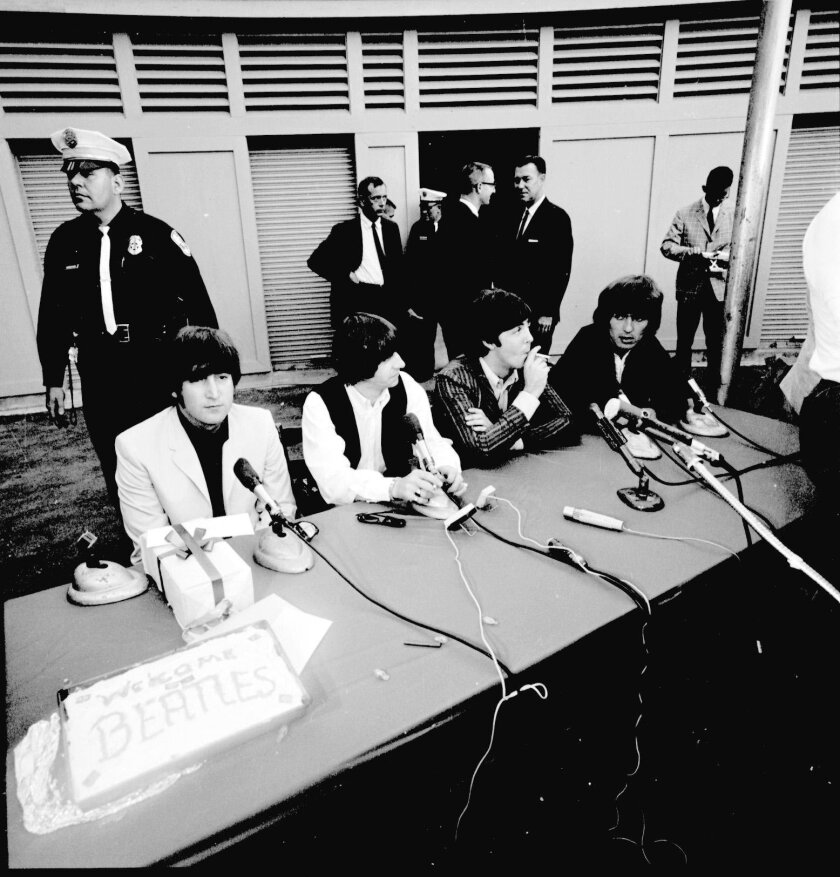
The Beatles at a press conference before their San Diego concert.
University of California Television (UCTV) is making a host of videos available on its website during this period of social distancing. Among them, with descriptions courtesy of UCTV (text written by UCTV staff):
“Fire and Early Homo Sapiens Innovations”: More than any other technology, the use of fire distinguishes human from non-human primate behavior. Fire was first employed by pre-Homo sapiens hominins more than a million years ago, and once people learned to control and reproduce fire, its usefulness broadened and played a key role in hominin evolution. Developing fire technology beyond the basic uses of light, warmth, cooking and protection from predators, Homo sapiens used fire in increasingly sophisticated ways. These included medicinal smoke, the forging of weapons and the creation of other useful products. This, in turn, led to expanding trade and the rise of early economies.
“Making the Most of a Gap Year”: A “gap year” is a semester or full year of experiential learning typically taken between high school graduation and college enrollment, though they are also taken between academic years. They are intended to give students a break from academics to discover themselves and consider what kind of education and career they want to pursue. There are pros and cons in interrupting one’s formal education, but a growing consensus among educators holds that the benefits outweigh potential disadvantages. In this program, experts discuss how gap year programs are faring during the COVID-19 pandemic, including observations from a current gap year student.
“Beatles Revolutions: ‘Let It Be’”: Alan Parsons was a teenage sound engineer at Abbey Road Studios when assigned to record audio for the Beatles as they worked through their penultimate album (followed by “Abbey Road”). In this dialogue between Parsons and UC Santa Barbara music professor David Novak, they discuss recording equipment, studio layouts, song inspirations, the musical and personal interplay of the band members, producer Phil Spector’s controversial participation, the personal and artistic turmoil surrounding the making of the album, and the complicated history of Michael Lindsay-Hogg’s “Let It Be” documentary. Parsons also comments on the tensions that frequently accompany the creative process.
And finally: Arts in the Time of COVID

Musician Gilbert Castellanos
(Eduardo Contreras/The San Diego Union-Tribune)
In this week’s edition of Arts in the Time of COVID, Pacific editor Nina Garin talks about the Old Globe’s season announcement, La Jolla Playhouse’s latest Without Walls production and trumpet dynamo Gilbert Castellanos. Watch it here.


:strip_icc()/BHG_PTSN19720-33d9cd22f6ab49e6a21982e451321898.jpg)

More Stories
Fresh and Airy Interior Design Living Room Ideas for Summer
Where Art and Sound Converge: Exploring Fine Art Photography and Music Artist Portraiture
Cooking Chinese Cuisine with Ease Using Jackery Solar Generator 5000 Plus